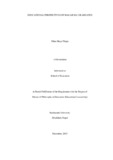
Please use this identifier to cite or link to this item:
https://hdl.handle.net/20.500.14301/277| Title: | EDUCATIONAL PERSPECTIVES OF MAGAR SLC GRADUATES |
| Authors: | Thapa, Dhan Maya |
| Citation: | Thapa,D.N.(2013). Educational Perspectives of Magar SLC Graduates |
| Issue Date: | Dec-2013 |
| Publisher: | Kathmandu University School of Education |
| School: | SOED |
| Department: | DOEL |
| Level: | M.Phil. |
| Program: | MPhil in Educational Leadership |
| Abstract: | In formal education system of Nepal, Higher Secondary level is the ultimate level of school education and thus is the prerequisite for entry into the study of higher levels and provides a basis for entry into the world of work in Nepal. Literatures show that some ethnic groups and minorities have less participation at this level and being a student of ‘education’ and ‘research’ from such an ethnic background, these facts knocked my conscience giving rise to the curiosity to look into the matters taking one of such ethnic groups (Magar community) under study. The Magar community is one such ethnic community that has not shown expected progress in educational sector. So, how a particular group of Magar community is taking the education was my curiosity. So, this research aspired to explore the educational perceptions of School Leaving Certificate (SLC) graduates belonging to Magar community on continuing or not continuing further education. More specifically, the study endeavored to probe into the aspects influencing their educational perceptions and participation. ii This study was designed qualitatively under interpretative paradigm with the intention to adopt flexible structure and local participation. I adopted case study method to serve the end of my research questions and research purpose. Purposefully, Boughagumha and Nayarnamtalesh VDC (Village Development Committee) of Palpa district were identified as research fields being the density of Magar population in these VDCs 99% and 70% respectively. I interviewed sixteen Magar SLC graduates until I reached the data saturation. I generated the study data mainly through different research tools and techniques in the field. In the first stage of data generation, I conducted PRA (Participatory Rural Appraisal) as an approach as well as tool in both the communities, through which in-depth issues were dug out. Then, I conducted Focus Group Discussion (FGD) and interviews with the participants. In the process of data analysis and interpretation, my emphasis was always on yielding real meaning subjectively bringing into play my observation and reflection as well. I interpreted the findings of the study using narrative and reflective writing style linking the interpretation with relevant theories such as Bourdieu’s theory. The study showed that Magar SLC graduates had veracity perspectives. They are optimistic towards education. However, the study witnessed that there was a lack of proper guidance, self-effort, vision and planning for further education among Magar SLC graduates. This research explored some important influencing aspects that forced the Magar SLC graduates to construct the perceptions regarding higher education as well. It was identified that social orientations affect individual’s perceptions towards education. Similarly, self motivation was identified as crucial cause. Therefore, it is imperative to provide the Magar students with proper iii counseling and forming encouraging family and social environment to enhance their desirable inclusion in further education. Keywords: Education, Magar, community, perception, attitude, culture. |
| URI: | https://hdl.handle.net/20.500.14301/277 |
| Appears in Collections: | Dissertation |
Files in This Item:
| File | Description | Size | Format | |
|---|---|---|---|---|
| Dhan Maya.pdf | 1.44 MB | Adobe PDF |  View/Open |
Items in DSpace are protected by copyright, with all rights reserved, unless otherwise indicated.